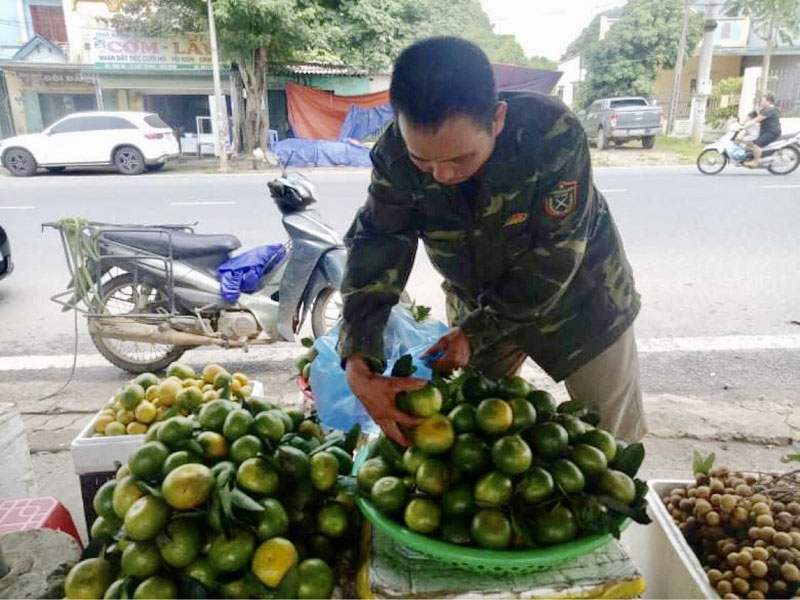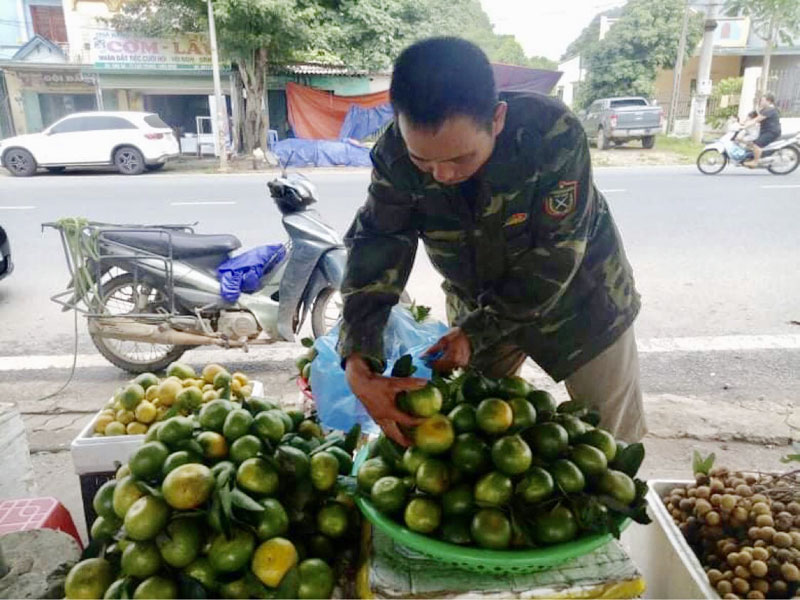
(HBO) - The beginning of August was when the harvest of On Chau tangerines in Cao Phong started, opening up the harvest season of citrus fruit across the district. Local farmers said their tangerine trees produced a high yield this year and the fruit fetched higher prices against last year, at 24,000 – 25,000 VND per kg if bought right at the orchards. On Chau tangerines sell well both in and outside the province.
 Customers select On Chau tangerine at a fruit store
in Cao Phong town.
Customers select On Chau tangerine at a fruit store
in Cao Phong town.
In Cao Phong town, Tay Phong, Dung Phong, and Bac Phong
communes, tangerine is intercropped among different orange varieties. Its
harvest season often last for two months, with each ha of the fruit tree
earning between 500 and 600 million VND (21,582 – 25,911 USD) on average. The
tangerine is thin-skinned, succulent, and seedless. Demand for the fruit has
been on the rise in recent years.
Vendors in Cao Phong and Hoa Binh city said even when the
tangerines are yet to be fully ripen, the harvest season has ended.
Nguyen Thi Tu, a vendor in Cao Phong town’s Bop market said
despite its sour taste, the tangerine is very popular among consumers, adding
that she sold hundreds of kg of the fruit per day in retail and wholesale.
Bui Van Dan, head of the district’s office for agriculture
and rural development said the quality of On Chau tangerine has been improved
thank to the application of sci-technological advances in cultivation. The fruit’s yield, quality and price were stable in recent
years, he said. According to the official, local farmers are striving for
their citrus fruit to meet the VietGap and organic standards./.
According to data from the Hoa Binh Provincial Party Committee, the industrial production index for the first six months of 2025 is estimated to have increased by 20% compared to the same period last year. This marks the highest year-on-year growth rate for this period since 2020.
In the first six months of 2025, Hoa Binh province’s export turnover was estimated at 1.145 billion USD, marking an 18.11% increase compared to the same period in 2024. Import turnover was estimated at $ 804 million, a 17.15% increase, which helped the province maintain a positive trade balance.
The lives of the ethnic minority farmers in Tan Lac district have gradually improved thanks to the new directions in agricultural production. This is a testament to the collective strength fostered through the professional associations and groups implemented by various levels of the district’s Farmers’ Union.
With the motto the "product quality comes first,” after nearly one year of establishment and operation, Muong village’s Clean Food Agricultural and Commercial Cooperative, located in Cau Hamlet, Hung Son Commune (Kim Boi district), has launched reputable, high-quality agricultural products to the market that are well-received by consumers. The products such as Muong village’s pork sausage, salt-cured chicken, and salt-cured pork hocks have gradually carved out a place in the market and they are on the path to obtaining the OCOP certification.
In the past, the phrase "bumper harvest, rock-bottom prices" was a familiar refrain for Vietnamese farmers engaged in fragmented, small-scale agriculture. But today, a new spirit is emerging across rural areas of Hoa Binh province - one of collaboration, organisation, and collective economic models that provide a stable foundation for production.
Maintaining growing area codes and packing facility codes in accordance with regulations is a mandatory requirement for agricultural products to be eligible for export. Recently, the Department of Agriculture and Environment of Hoa Binh province has intensified technical supervision of designated farming areas and packing facilities to safeguard the "green passport" that enables its products to access international markets.



 Customers select On Chau tangerine at a fruit store
in Cao Phong town.
Customers select On Chau tangerine at a fruit store
in Cao Phong town.